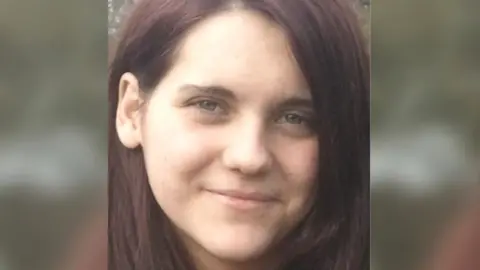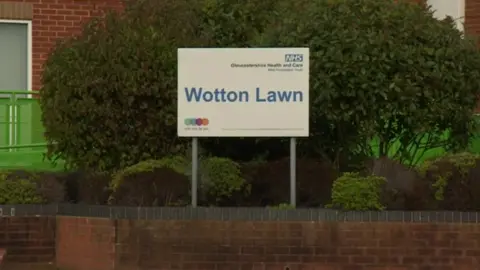Parents call for change in borderline personality disorder treatment
 Davis family
Davis familyThe parents of a woman who died in a psychiatric facility believe with different treatment she could have avoided hospital altogether.
Laura Davis, 22, from Cheltenham, took her own life at Arbury Court in Warrington on 20 February, 2017.
Ms Davis, who had borderline personality disorder, was previously at Wotton Lawn hospital in Gloucester.
Her parents say if she could have had psychotherapy in the community, she might not have needed inpatient care.
On Wednesday, a jury at Cheshire Coroner's Court returned a conclusion of suicide in an inquest into Ms Davis' death.
The jury highlighted failures in communication and record keeping at both hospitals, particularly regarding items that posed a suicide risk for Ms Davis.

- If you have been affected by the issues raised in this story help and support is available via the BBC Action Line

Both hospital trusts expressed their condolences and said lessons had been learned since Ms Davis' death.
Speaking after the jury's decision, Ms Davis' mother Joanna Davis said her daughter had never received structured therapy.
She said lack of treatment both in the community and in hospitals was trapping people in a "revolving door" cycle of inpatient admissions.
Joanna spent 17 years as a mental health coordinator - helping people find accommodation and access services after discharge from psychiatric hospitals.
 Family photo
Family photoBut she said the majority of this support has now been cut.
"I am just sad that services like that are not available anymore," she said.
Borderline personality disorder (BPD) is also known as emotionally unstable personality disorder (EUPD).
It is characterised by intense emotions that can change very quickly, fear of abandonment, deep feelings of insecurity, paranoia and difficulty building and maintaining stable relationships.
'Fear of aggression'
Those with the condition may act impulsively or engage in behaviours that can harm them such as drug and alcohol abuse, binge eating or risk taking.
Using self-harm to manage their feelings and suicidal ideation is also common among people with BPD.
Joanna said there was a misconception that people with BPD are violent, and that staff are trained not to show any emotion around these patients "because of the fear of aggression".
She said her daughter had not been offered emotional support through talking-based therapy while in hospital.
While in Wotton Lawn between June and November 2016, Ms Davis was admitted to A&E 48 times due to self-inflicted injuries.
'Negative bias'
Ms Davis' stepfather Darren Watts said research had shown people with a diagnosis of BPD faced "negative bias" from clinicians treating them.
"Clinicians have a tendency, out of frustration at patients not getting better, to 'blame the patient' rather than looking at whether they are getting the right support," he said.
"The lack of structured therapy means they are not giving the patient the opportunity to step out of that psychiatric hospital environment," Mr Watts said.

Joanna said in future, she hoped mental health workers would be given more training in EUPD.
"It is about understanding BPD is not a dangerous diagnosis - it is not a diagnosis where you don't give people emotional support," she said.
Joanna continued: "It is not down to people who are actually doing the job on the ground, that is down to the training that the leadership decide they have.
"I would go and find training if I felt I didn't have the resources to do my job. But people are so stretched and pushed, they just don't have the opportunity. They would love to learn, I am sure."
'Important lessons'
Elysium Healthcare - the private provider which runs Arbury Court - said it "apologised unreservedly" for the shortcomings in Ms Davis's care identified during the inquest.
It said "important lessons" had been learned and implemented since her death to improve communication between providers.
Following the inquest, a spokeswoman for Gloucestershire Health and Care NHS Foundation Trust, which runs Wotton Lawn, said it had conducted its own investigation into Ms Davis's death, as well as cooperating with other inquiries.
The spokeswoman said all learning had been "incorporated into our trust's policies and procedures and we are committed to ensuring that we do everything we can to prevent such an event taking place again".

Follow BBC West on Facebook, Twitter and Instagram. Send your story ideas to: [email protected]
